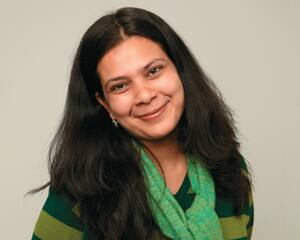Q: Did you always want to be a film director?
A: I never even dreamt of getting into direction. My seniors from St. Stephens, relatives, everyone was in news media, so the profession made perfect sense to me, until a point came when I was a bit disillusioned. It never occurred to me that I would make a movie. Film happened by accident in 2004, a year after I left NDTV. One good thing that happened during the job was I met my to-be husband Mahmood Farooqui.
Q: What took you so long to make your debut film?
A: We got married in 2002. Around a year later, we had both quit our jobs and had no resources. We had to replan what we wanted to do in life. I worked on a couple of documentaries for BBC World and NatGeo and made a documentary on playwright Habib Tanwir.
It was around then, towards the end of 2005 the idea about Peepli Live shaped up in my head. It wasn’t a news idea for a documentary. It was a narrative fiction story. Therefore I chose to make a film out of it. The idea could not be told any other way. Through a common friend Avan Contractor, I wrote to Aamir Khan, who replied immediately because he thought I was joking. Those days his film Mangal Pandey – The Rising was around completion or releasing. And my film was called The Falling. So he thought someone was pulling a fast one on him.
Q: What was the most difficult thing about your first film?
A: The wait. You need to be a very patient person, I guess. After I first sent the script to Aamir, six months passed before someone told me that the script got lost in his house. So I resent it. Then during one of his shoots in Delhi, I gave him an hour long narration. He was completely quiet. You can’t gauge from his expressions.
In a couple months, he asked me to come and narrate to Kiran and Prasoon Joshi. This was 2006. Then one day Aamir called all his film teams and broke the news that he is taking over the reins of Taare Zameen Par and that he had once done an error in judgment so he wanted all three teams to give a test shoot of four scenes from our film on video and make it within a budget of two lakh rupees. It was then that he gave the go ahead. We were told they will produce the film. But no one was given a date. After a while the wait gets to you, because the script is ready. So you just wait.
Q: Wasn’t the wait worth the final product and the adulation you got?
A: For people in films, direction, making a film is a very intimately creative process. What remains with you is the experience of making that product, rather than the product itself. When I see Peepli Live, even today, it’s not about the film, but the experience that I had while making the film. The process is larger than the product.
Q: The exhaustion was also because of your differences with Aamir Khan?
A: We left Mumbai on May 21. The film released in August. The reactions about the film came second hand to us. It was perhaps better that way. I would rather have people see my work and react to it. It could have been less bitter. I would have preferred the attention to be on the film, than on the issues between Aamir and me. Even if we hadn’t had differences, I wouldn’t have been in the forefront. I prefer to let my film do the talking.
Q: When do we see you directing again?
A:I will not direct because that is expected of me. When I have a story to tell on a film format, I will do it. At present, I am working with Mahmood on Dastangoi (a form of storytelling in Urdu).

